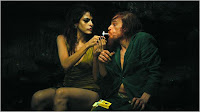
Following a spate of five star embraces from this year's critics at Cannes, my expectations for Leo Carax's Holy Motors were high, but really, I couldn't have asked for a more perfect cinematic experience from the director who hasn't given us a full length feature since 1999's Pola X. This is something remarkably special, the like of which we don't get too often these days.
Here's what The Guardian's Pete Bradshaw said back in May:
'… this is what we have all come to Cannes for: for something different, experimental, a tilting at windmills, a great big pole-vault over the barrier of normality by someone who feels that the possibilities of cinema have not been exhausted by conventional realist drama. Some may find it affected or exasperating; I found it weightless and euphoric.'
Like all great films about cinema and its relation to reality, Holy Motors bursts with references and nods to other writers and directors. In the above review Bradshaw notes similarities to David Lynch; Fritz Lang; Gaspar Noé; as well as Kafka; JG Ballard; Aldous Huxley and Lewis Carroll. He's right to mention Lynch, of course, no modern film surrealism on film escapes the great man's influence, even if the greatest single homage I could detect was the flickering exit sign during the prologue where Carax himself exits his bedroom to enter the cinema screening his feature.
But if there's a cinematic ghost haunting Carax's film, it's that of a far more legendary surrealist: Luis Bunuel. The absurdist, episodic nature not only recalls The Phantom Of Liberty (1974) but almost covers as much ground subject-wise as Bunuel did with his masterpiece. Where Bunuel mocked bourgeoisie society, church and our arbitrary taboos surrounding sexuality, Carax looks at the the roles we force ourselves to play in the space of a day and posits an alternative spirituality to address modern stresses.
Denis Lavant as Monsieur Oscar is driven from location to location in an enormous white limousine that doubles as his dressing room. Each of the many identity he adopts given to him in a Mission Impossible-style file, each one more onerous and requiring a startling transformation from banker to female beggar, hit man (seemingly killing himself) to a motion capture specialist.
In the space of a day Oscar seems to ride the zeitgeist of present-day Paris from hi-tech bande desinee flash to the mundanity of parenthood dealing with teenage insecurities. One character: the green-suited gnome of 'Monsieur Merde', represents the current shibboleth of post-9/11 cultural fear, scaring tourists in Père Lachaise, attacking fashionistas and abducting Eva Mendes from a fashion shoot only to transform her sleek dress to a full burka in an underground grotto. It's all wonderfully bonkers.

While Oscar's commitment to his designated roles is absolute, we learn along the way that others he encounters are, themselves, involved in playing similar roles, like jobbing actors passing through bit parts and walk-ons. in some greater, unseen movie. Kylie appears as his former lover, bursting into song only to fulfil her role as a suicide. She's excellent, by the way.

One more Bunuel connection happens in the film's most despairing moment where an exhausted Oscar is confronted by a representative of his invisible bosses, played by Michel Piccoli: a veteran of Bunuel's films. He represents the mysterious cabal with the invisible cameras, capturing Oscar's boundless creativity but gently chiding him for appearing slightly weary of this sisyphian task. It's a fabulous evocation of that numbing sense of failing in the workplace.
Weirdly, this is the second top grade film this year that uses the stretch limousine as its base of operations for our central hero/anti-hero. Cronenberg's Cosmopolis (another brilliant film that confounds expectations, dares to use metaphor and artifice to hold a mirror to ourselves and pulls off the remarkable trick of making R-Patz into a great screen actor) poses the question 'where do the sees limos go at night when we all sleep?' At the denouement of Cosmopolis we find out that they all go into underground car parks, and in similar fashion we finally see Edith Scob - as driver, Celine - deposit the car amongst all the others in a depot belonging to the titular company that sends out the actors to play their bit parts. In a final jocular twist we hear the limos discuss their oncoming redundancy: meanwhile Oscar performs his ultimate role for the day, in his own house in an endless suburbia, albeit with a somewhat unconventional family group.
Holy Motors is absurd, beautiful, profound and contains enough wit and humour to make its two hours of industrial grade surrealism seem like a breeze. And it manages to make accordions cool.
It's out in September, and you really must see it.
No comments:
Post a Comment